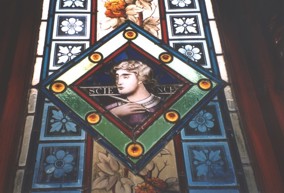
From the very beginning, Science has been a key area of study at MLC, providing extensive opportunities for students to reinforce their learning through real-life experiences.

MLC has championed science for girls since its foundation, as reflected in the stained-glass windows in the Tiddeman Boarding House from 1885, designed by distinguished architect, J Edmund Burke. The three-panelled window, which showcases the study of music on the left and science on the right, was designed to inspire students to a diverse range subjects.
Today, Science remains a foundational curriculum area, and the College continues to encourage its study and invest in a curriculum that applies to the lives of students today. All students from Prep to Year 6 are introduced to increasingly complex scientific concepts in Biological, Chemical, Earth and Space, and Physical Sciences. From Years 7-10, all students take Science as a discrete subject within their timetable, with the curriculum covering Biology, Chemistry, Physics, and Earth Science. In Year 10 students are able to extend their learning through electives Advanced Biology and Psychology.
Providing breadth to support the diverse interests of our Senior School students, those pursuing Science can specialize across the individual disciplines of Biology, Chemistry, Physics, and Psychology in both the VCE and the IB Diploma, with further options of Sports, Exercise and Health Science or Environmental Systems and Societies in the IB Diploma and related options in VCE of Physical Education, VET Sport and Recreation, and Health and Human Development.
In recent years, 15-20% of students in each graduating class are offered places in courses studying natural and physical sciences, and another 10-12% are offered opportunities for further study in health-related fields such as medicine, nursing, and sports science.
Learning in real-life contexts
MLC’s science program extends beyond the classroom, offering numerous opportunities to apply their learning in a wide range of contexts and settings. Excursions and incursions are regular occurrences across many year levels, from visits to Luna Park for Physics discoveries to researching sea life at Queenscliff’s Marine and Freshwater Discovery Centre, and building cars in the F1 in Schools STEM Challenge.
Additionally, student-led clubs such as PRISM (People Really Into Science at MLC) and the LEGO Robotics Club, are integral to the science program, making science both engaging and hands-on.
Another prime example of these enriching experiences is MLC’s longstanding partnership with the School of BioSciences at the University of Melbourne. For over 12 years, this collaboration has provided invaluable workshops tailored to the curriculum, enhancing students’ understanding of complex scientific concepts. Students experience a large lab in a tertiary education setting (pictured below), first prepping in safety PPE before each student uses a dissecting microscope, CO2 to anaesthetise a tube of flies, an ELISA3 kit, and a micropipette to complete two fast-paced activities. The first of these is searching for evidence of evolutionary change in fruit flies, and the second is a case study in immunity and influenza. The workshop concludes with a discussion on immunity types and vaccinations.

“It is a fabulous opportunity for students to experience a workshop in a large university lab, giving them a real taste of Biology at tertiary level,” says Jo Hamer, MLC’s Science Technical Services Coordinator who accompanied the students. “It’s experiences like this that connect the dots between what we learn in the classroom and what students can do with that knowledge beyond school.”
In another example of hands-on learning, IB Diploma students share their love of science through a series of student-designed practical demonstrations. The annual Group 4 Project requires Year 11 students to work collaboratively in small groups on a multidisciplinary science project to create an experiment that will enable them to share scientific understanding with Year 5 students. The subsequent demonstration day is an annual highlight for all participants and is one of two trips to the secondary science labs by Year 5 each year, the other being a ‘dissection day’ run by secondary staff.






